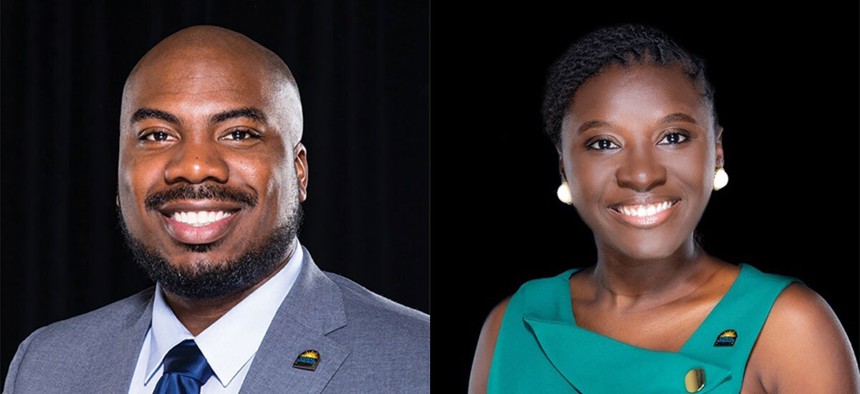Policy
Black electeds in South Florida add voices to AP African American course dispute
'We will fight like hell to make sure that African American history continues to be a part of American history,' one city commissioner said.

Coral Springs city commissioners Joshua Simmons and Nancy Metayer Bowen. City of Coral Springs/Photo illustration by Anabel Dayao
Black leaders in South Florida are joining others around the state who are irate over the DeSantis administration’s handling of an Advanced Placement (AP) African American studies course that state officials said was inappropriately politicized.
The state’s Department of Education last month sent a letter to The College Board, which designs the course, that its AP African American studies course wouldn’t be offered in Florida public schools. High school students can take AP courses and exams for college credit.
The state objected to topics in the course, including “Black queer studies” and “the reparations movement.” Gov. Ron DeSantis has frequently decried critical race theory, which is based on the premise that racism is embedded in American society, characterizing it as a vehicle for the indoctrination of students.
The College Board recently released a new framework that appears to have dropped content that drew objections from the state, but it said Florida’s objections were not taken into account when making revisions to the course.
Before that, chants and prayers rang out in the Florida Capitol as Black lawmakers protested the state's handling of the course and prominent civil-rights attorney Ben Crump threatened a lawsuit. House Democratic Leader Fentrice Driskell of Tampa said the administration’s decision is the “first of what I believe will be many attempts to whitewash history in order to suit emotionally fragile people.”
Just last week, Coral Springs City Commissioner Joshua Simmons said during a commission meeting that by picking and choosing what to teach, students would not learn the totality of the African American experience in the United States. He made history in 2018 as the first African American to be elected commissioner in the city since its incorporation in 1963.
“Students are not required to take AP courses. Young people should have the opportunity to learn about African American history. Gov. DeSantis should not prevent students from learning the importance of this history. It is very important to the United States,” Simmons said.
His fellow city commissioner Nancy Metayer Bowen is the city’s first Black and Haitian-American woman on the panel. “It is wrong to ban the teaching of African American history in schools. Young people need to learn about the important contributions that African people have made to United States history,” she added.
They join a host of others who have challenged state officials, including White House Press Secretary Karine Jean-Pierre, who also is Black. "It is incomprehensible to see … this ban, or this block, to be more specific, that DeSantis has put forward. If you think about the study of Black Americans, that is what he wants to block,” she said at a press briefing last month.
Black religious and community leaders in Tallahassee gathered at the city’s Bethel Missionary Baptist Church to announce a Feb. 16 rally that will include national civil rights and faith leaders. “Black history matters. Black history is not inferior. And Black history does not lack educational value,” said the Rev. R.B. Holmes, pastor of Bethel Missionary Baptist.
“We’re organizing a campaign to have a real conversation, a positive conversation, on the quality of teaching and learning about all people’s history — and not at the expense of erasing and eliminating Black studies,” Holmes added.
Tallahassee City Commissioner Curtis Richardson, who joined Holmes at a news conference, said Black leaders would prefer to open a dialogue with the governor. “We welcome a conversation and dialogue with the governor, if he is amenable to that. If not, we will fight like hell to make sure that African American history continues to be a part of American history,” said Richardson, a former state House member.
But DeSantis press secretary Bryan Griffin said in a statement that the AP course, as it previously existed, “is a vehicle for a political agenda and leaves large, ambiguous gaps that can be filled with additional ideological material, which we will not allow.”
The Tallahassee Democrat reported last week that Leon County Commissioner Bill Proctor, “also a local pastor and (who) teaches political science at Florida A&M University, is pushing … DeSantis to develop an African American studies college curriculum that actually reflects the Black experience.”
Proctor, a Democrat, called the revised AP course “trash.”
“The pillars of African American history are not what the College Board has come up with,” he said. “They clearly lack academic rigor. It lacks any substantive review. No scholars with proficiency in African American history have even weighed in.”
The News Service of Florida contributed to this story. David Volz has been a reporter for numerous community news publications throughout South Florida over the past two decades, as well as the South Florida Sun-Sentinel, Miami Herald and South Florida Business Journal. He covers local government, schools, sports, culture, faith groups and workplaces.
NEXT STORY: Special session called on Disney Reedy Creek district, migrant flights, other issues